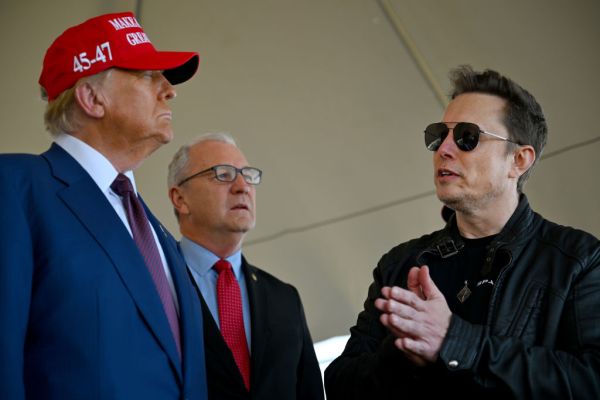President-elect Donald Trump and senior advisers Elon Musk and Vivek Ramaswamy, the co-chairs of the proposed Department of Government Efficiency, have grand plans for slashing federal spending. As part of that agenda they have raised the possibility of simply not spending congressionally enacted appropriations. Instead, they would “impound” the monies and, in doing so, would challenge the constitutionality of the Congressional Budget and Impoundment Control Act of 1974. This is the statute that allows the president to withhold spending funds he has specifically identified for up to 45 days but then obligates him to release those funds if Congress has not affirmatively approved the president’s impoundment decision.
Trump and his team will argue that past presidents have exercised this prerogative and have not had to gain the okay of the Congress to do so. They will say that the president’s authority rests on his general constitutional duty as the nation’s chief executive to see to the sound and fiscally responsible administration of the government. Like any CEO, the argument will go, it is his obligation to “faithfully execute the Office of President” and see that monies are not wasted.
The earliest example of a president impounding monies occurred in 1803, when Thomas Jefferson told Congress he would not be spending the $50,000 the Senate and the House had appropriated for acquiring gunboats to be deployed on the Mississippi River. The purchase of the Louisiana Territory and the resulting unimpeded access from the river to the Gulf of Mexico “rendered an immediate execution of that law unnecessary” given “the favorable and peaceable turn of affairs.” And while Jefferson went ahead the following year with acquiring the gunboats, he clearly thought that the statutory appropriations for the program were not mandatory and that he had an inherent authority to judge whether spending the monies was appropriate.
Jefferson was hardly the last president to impound congressionally directed monies. President Ulysses S. Grant signed a public works bill in 1876 but, in his signing message, said he would not expend any of the public money for projects that were in his estimation for “local interest, [and] in no sense national.” Not surprisingly, the frequency of impoundments and threats of impoundment rose as the size of the federal government increased and the role of the presidency expanded. Presidents Roosevelt, Truman, Eisenhower, Kennedy, and Johnson refused to spend appropriated monies, typically for fiscal and defense-related reasons, with the most controversial impoundments occurring when a president refused to go forward with specific weapon programs that Congress had put in the defense budget.
These impoundments certainly aggravated Congress, with members believing their core constitutional power over the budget was being tested. Yet, impoundments were not so regular as to keep Congress continually frustrated. And, not infrequently, an administration and the relevant committees would reach some accommodation, averting a constitutional crisis.
Like so many other things having to do with powers exercised by the White House, presidential impoundments became a major dispute between the political branches during the Nixon presidency. In a January 1973 news conference that took place shortly after he was sworn in for a second term, Nixon asserted he had a “constitutional right” not to spend money appropriated by Congress “if the Congress overspends.” Expanding the notion of what it meant to be the country’s chief executive, Nixon proceeded to cut funds for a host of domestic programs having to do with urban renewal, clean water, health, and Model Cities. But the administration was all-in on spending on projects like a manned landing on Mars, supersonic transport, anti-ballistic missile defenses, enlarging the merchant fleet, and general revenue sharing with the states. In short, it wasn’t difficult for Congress to read Nixon’s assertion of a constitutional prerogative to refuse to spend duly appropriated monies as largely a cover for prioritizing his preferred policies.
Taking advantage of a Watergate-imperiled presidency, Congress passed and Nixon signed into law the Congressional Budget and Impoundment Control Act in July 1974. The law seemed a reasonable compromise; it gave the president discretion to impound funds and required him to justify his doing so in a message to Congress. At the same time, it preserved Congress’ power over the public purse by giving members the final say over whether a particular impoundment would stand. Indeed, in some ways, the statute seemed to be a victory of sorts for the presidency. Congress recognized some limited form of impoundment authority and, through the other measures in the law—creation of the Congressional Budget Office (CBO) and a new congressional budget resolutionprocess—seemed to accept Nixon’s argument that Congress had been insufficiently serious about public spending.
In practice, the act has had two positive results. First, since its enactment, presidents have stopped making expansive impoundment decisions. Second, by establishing the CBO, and having it run in a professional and largely nonpartisan manner, Congress and the public now have serious cost estimates for proposed legislation and an alternative analysis of proposed administration budgets’ impact on the economy and the federal budget. Given the positive spin both Congress and the White House typically put on proposed budgets, spending bills, and tax measures, having the CBO analyses is often a useful reality check.
However, if the act’s principal goals were to give the president a statutory tool to be an effective administrator of the public’s monies and, in turn, make the Congress a more responsible actor regarding the federal budget, it can’t be said to have succeeded. According to the Government Accountability Office (GAO), Congress accepted just a little more than a quarter of presidential proposed impoundments from the time the law was enacted through 2020, with savings amounting to some $25 billion. That’s not nothing. However, given the number of years and the immense size of the federal budget, that is far less than what might have been expected or could be justified.
In turn, it would be hard to argue that the budget process outlined in the act has made Congress a better steward of the public purse. Appropriation bills are rarely enacted before the end of the fiscal year, with the result that stopgap continuing resolutions (CRs) are now routine, averaging five a year for the past quarter-century. Indeed, CRs were actually used to fund the government for the whole year in three different years. Nor has the act’s budget process helped control deficits. Congress’ episodic efforts on that front have been a product of unique laws, such as the 2011 Budget Control Act, that mandated spending caps.
All of which is to say, Congress has given the incoming Trump White House the policy high ground for making the case for presidential impoundments. “Wasteful spending has to stop,” or so his team will argue, selectively picking, like Nixon, what it considers to be “wasteful” and conveniently ignoring Trump’s own role in increasing the deficits in his first term in office. Indeed, given the likely deficits produced by candidate Trump’s spending plans and promised tax and tariff measures, he will want to use impoundment not only to divest government programs he doesn’t like but also, and with no irony whatsoever, to claim impoundments are necessary to control federal spending.
To meet Trump’s challenge at least to a degree, Congress could begin by amending the 1974 statute and mandate that, once it receives notice of an impoundment from the White House, it must vote to approve or disapprove of the president’s decision. This contrasts with the current situation, in which the Congress can reject an impoundment by simply not voting on it. Making that change would presumably force more give-and-take between the branches.
But, admittedly, “give-and-take” is not something Trump is known for. More likely he will insist that, as the nation’s chief executive, he has an absolute authority to impound funds.
In theory, in protecting its authority over the public purse, Congress should have the upper hand. If a president insists on impounding monies for this or that program, Congress can threaten not to fund favored administration programs or even offices within the White House. But this would require Senate and House leadership to take their institutional privileges more seriously than we have seen in recent years. With Republicans presently in the majority in both chambers, one wonders how much they might resist President Trump if or when he decides to ignore an appropriation in the name of the nation’s fiscal health.
In all likelihood, the default position will be to look to the Supreme Court to decide the matter. To date, the court has not considered whether the president has an inherent power to impound funds as part of his duties to faithfully execute his office and, in turn, whether the 1974 law is constitutional.
The only impoundment case of note to make it to the Supreme Court was Train v. City of New York (1975), which arose before the enactment of the Budget Control and Impoundment Act. The issue before the court was whether the Nixon administration had discretion not to fully spend funds Congress had appropriated for the states and local authorities to tackle water pollution. In its oral argument, the government said that it was resting the administration’s case on an interpretation of the underlying statute, and was not in this instance asserting a broader constitutional privilege. The administration lost, in a unanimous decision finding the president did not have that discretion as a matter of statutory construction.
The court’s decision seems to imply that the more specific Congress is in its spending language, the more ministerial the execution of the law, the less discretion the president has to withhold funds. Yet, pushed to the extreme, this view would suggest Congress could legitimately attempt to direct the actions of administrative officers so thoroughly by appropriations language that it would challenge whether the president, as the office vested with “the executive power,” actually controls his administration. This would largely vitiate one of the principal reasons the framers of the Constitution in 1787 crafted an independent executive.
There is no getting around that the Constitution contains two potentially contending authorities: Congress having the power to direct federal resources and the president having the power to administer the daily functioning of government. If either authority is carried to an extreme, one can undermine the other.
The circle to be squared is preserving Congress’ power over the purse while still providing for a limited level of presidential discretion to see to it that the resources of the federal government are spent properly and efficiently. The rub comes when presidents want to use that discretion for broader policy purposes.
Drawing a line that makes sense of the potentially competing principles without undermining either will be no easy task if the justices are faced with an impoundment case. The danger is a decision by the court that creates a hard and fast rule about something better left to the two political branches to sort out politically and prudentially. But Congress has too often abdicated its side of the fight in a system that Federalist 51 famously described as ambition countering ambition. Though not to be expected, one might hope that the court would force Congress to stand up for itself by refusing to settle the matter. Exercising an institutional muscle that has atrophied would be good for it and, in turn, the constitutional system as a whole.






Please note that we at The Dispatch hold ourselves, our work, and our commenters to a higher standard than other places on the internet. We welcome comments that foster genuine debate or discussion—including comments critical of us or our work—but responses that include ad hominem attacks on fellow Dispatch members or are intended to stoke fear and anger may be moderated.
With your membership, you only have the ability to comment on The Morning Dispatch articles. Consider upgrading to join the conversation everywhere.